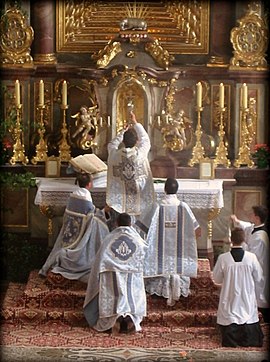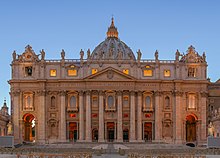
Back Tridentinische Messe ALS Трыдэнцкая Імша Byelorussian Missa tridentina Catalan Tridentská mše Czech Tridentinische Messe German Trenta meso Esperanto Misa tridentina Spanish Tridentiininen messu Finnish Rite tridentin French Aifreann Laidineach Irish

| Part of a series on the |
| Catholic Church |
|---|
 |
| Overview |
|
|
The Tridentine Mass,[1] also known as the Traditional Latin Mass[2][3] or the Traditional Rite,[4] is the liturgy in the Roman Missal of the Catholic Church codified in 1570 and published thereafter with amendments up to 1962. Celebrated almost exclusively in Ecclesiastical Latin, it was the most widely used Eucharistic liturgy in the world from its issuance in 1570 until the introduction of the Mass of Paul VI (promulgated in 1969, with the revised Roman Missal appearing in 1970).[5]
The edition promulgated by Pope John XXIII in 1962 (the last to bear the indication ex decreto Sacrosancti Concilii Tridentini restitutum) and Mass celebrated in accordance with it are described in the 2007 motu proprio Summorum Pontificum as an authorized form of the Church's liturgy, and sometimes spoken of as the Extraordinary Form, or the usus antiquior ("more ancient usage" in Latin).
"Tridentine" is derived from the Latin Tridentinus, "related to the city of Tridentum" (modern-day Trent, Italy), where the Council of Trent was held at the height of the Counter-Reformation. In response to a decision of that council,[6] Pope Pius V promulgated the 1570 Roman Missal, making it mandatory throughout the Latin Church, except in places and religious orders with missals from before 1370.[a] Although the Tridentine Mass is often described as the Latin Mass,[7] the post-Vatican II Mass published by Pope Paul VI and republished by Pope John Paul II,[8] which replaced it as the ordinary form of the Roman Rite, has its official text in Latin and is sometimes celebrated in that language.[9][10]
In 2007, Pope Benedict XVI issued the motu proprio Summorum Pontificum, accompanied by a letter to the world's bishops, authorizing use of the 1962 Tridentine Mass by all Latin Church Catholic priests in Masses celebrated without the people. These Masses "may—observing all the norms of law—also be attended by faithful who, of their own free will, ask to be admitted".[11] Permission for competent priests to use the Tridentine Mass as parish liturgies was to be given by the pastor or rector.[12]
Permissions for celebrating the 1962 form of the Tridentine Mass were replaced and abrogated by Pope Francis's motu proprio Traditionis Custodes in 2021, introducing additional restrictions.[13]
- ^ "BBC – Religions – Christianity: Tridentine Mass". www.bbc.co.uk.
- ^ "About the Traditional Latin Mass". Traditional Latin Mass Community of Philadelphia. Archived from the original on 2015-09-23. Retrieved 2023-12-22.
- ^ "What's a TLM, anyway? A Latin liturgy lexicon". The Pillar. 9 July 2021. Retrieved 21 July 2021.
- ^ Singh Boparai, Jaspreet (2021-08-26). "Suppression of the Traditional Rite". Catholic Herald. Retrieved 2021-08-26.
- ^ "Library : Liturgical Languages". www.catholicculture.org.
- ^ "CT25". history.hanover.edu.
- ^ Moorman, George J. (November 19, 2007). The Latin Mass Explained. TAN Books. ISBN 9781618909008 – via Google Books.
- ^ "Letter to the Bishops that accompanies the Apostolic Letter "Motu Proprio data" Summorum Pontificum on the Roman liturgy prior to the reform of 1970 (July 7, 2007) | BENEDICT XVI". www.vatican.va.
- ^ "Code of Canon Law: text – IntraText CT". www.intratext.com.
- ^ "Instruction Redemptionis Sacramentum". www.vatican.va.
- ^ Summorum Pontificum Archived 2012-10-10 at the Wayback Machine, articles 2 and 4
- ^ Summorum Pontificum Archived 2012-10-10 at the Wayback Machine, article 5
- ^ Pope Francis (16 July 2021). "Apostolic Letter issued "Motu proprio" by the Supreme Pontiff Francis "Traditionis custodes" on the use of the Roman Liturgy prior to the Reform of 1970, 16 July 2021". vatican.va. Rome. Retrieved 16 July 2021.
Cite error: There are <ref group=lower-alpha> tags or {{efn}} templates on this page, but the references will not show without a {{reflist|group=lower-alpha}} template or {{notelist}} template (see the help page).
© MMXXIII Rich X Search. We shall prevail. All rights reserved. Rich X Search